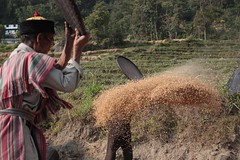 India: Traditional farming practices, Eastern Himalayas
India: Traditional farming practices, Eastern Himalayas
As well as the linkages between traditional knowledges and other components of biocultural heritage (see 'Evidence of Inter-Linkages'), there are many other interconnections amongst biocultural heritage.
Thinking about biocultural systems is useful to understand this complexity — how the different elements are inter-related and inter-dependent, and how changes in one will affect the others. Such a systems approach is useful for assessing climate change impacts, and planning responses.
A Biocultural System (BCS) is a complex, adaptive, linked social and ecological system and all its sub-systems and the relationships between them. These relationships between reciprocal parts of an indivisible whole are co-evolving and self-organising, producing rich biocultural diversity.
A complex systems view focuses analysis on the processes and relationships between the different parts. These processes help new, resilient and diverse patterns to emerge in the relationships between the parts. Unpredictability is a key characteristic of complex systems, so rather than trying to 'manage' the system, the focus shifts to creating conditions that foster the emergence of resilience and diversity.
Customary laws are also complex systems. They come from nature itself, from continuous use of biocultural resources and the interactions of different elements — biophysical, socio-cultural and spiritual. Customary law includes not only laws in the Western sense, but also related spiritual values and beliefs, and practices that are not bound by law, but obtain the force of law over time.
Asociacion ANDES (Peru) is exploring how complex systems theory can work as a tool to understand the inter-linkages in biocultural systems. A systems approach not only reflects indigenous perspectives, but reflects reality better than using pure ecology, law or other 'sectoral' concepts. And the approach can help to identify critical situations, or tipping points, that require urgent attention.